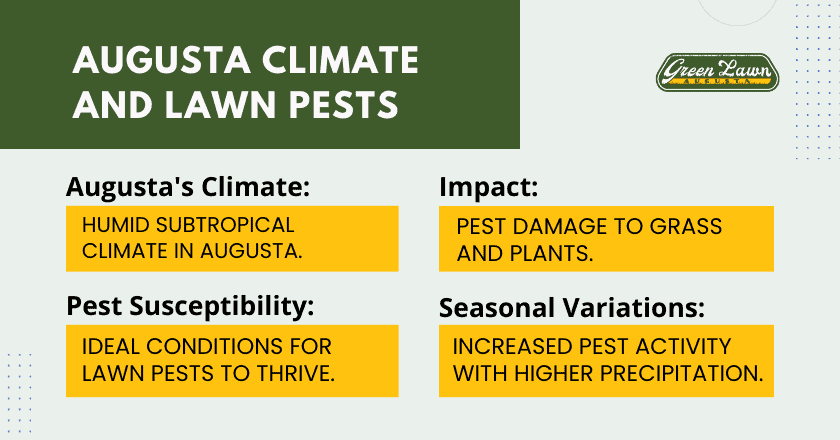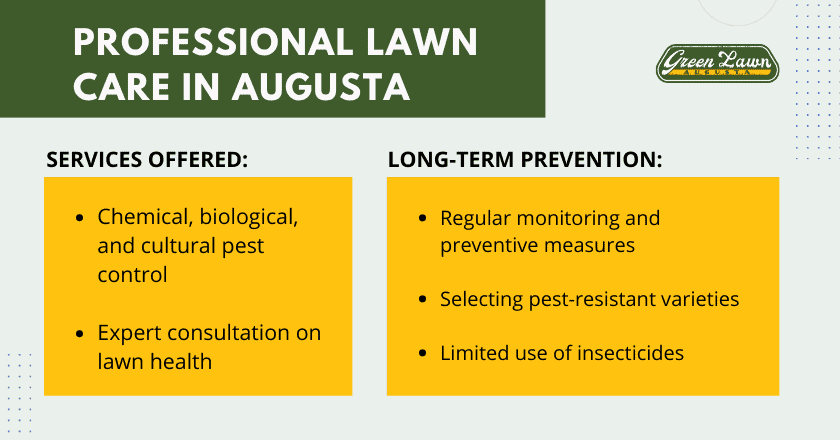Do you feel like your lawn is under siege? If so, some common lawn pests likely are to blame.
From white grubs to chinch bugs and everything in between, these invaders can wreak havoc on the beauty of your outdoor space.
But don’t fret — by understanding their life cycles and the damage they cause; you can identify which pests are present and get them under control.
Table of Contents
ToggleKey Takeaways
- White grubs, chinch bugs, armyworms, and mole crickets are common lawn pests that can cause significant damage to turf.
- These pests can damage grass and plants by feeding on roots, sucking out plant fluids, eating grass blades, and burrowing through the soil.
- Effective lawn pest control requires understanding the pests’ life cycles, the damage they cause, and the various control measures available.
- Pest control can be achieved through chemical control using insecticides, biological control using natural enemies, and cultural control methods such as proper lawn maintenance practices and selecting pest-resistant grass and plant varieties.
Identifying Common Lawn Pests

Common lawn pests include white grubs, chinch bugs, armyworms, mole crickets, and moles and voles. These pests can cause problems such as root damage, yellowing grass, brown patches, and underground tunnels.
Identifying these pests is an important first step in controlling and protecting your lawn.
What types of pests commonly infest lawns?
Lawns are plagued by various pests, including white grubs, chinch bugs, armyworms, mole crickets, moles, and voles.
- White grubs feed on grass roots and can cause significant damage to lawns.
- Chinch bugs suck out the plant’s fluids, leading to yellowing and eventual death.
- Armyworms caterpillars eat grass blades, resulting in thinning and brown patches.
- Mole crickets burrow through the soil and feed on plant roots, while moles create tunnels that can make the lawn uneven.
- Voles eat both grass and ornamental plants’ roots.
The humid climate provides perfect conditions for these pests to thrive, so it’s important to be aware of them to prevent damage to your lawn.
What kind of damage do these pests cause?
You may notice significant damage to your lawn if you don’t take steps to prevent and control the common pests.
- White grubs feed on the grass’s roots and can cause the grass’s wilting and death.
- Chinch bugs suck out plant fluids, leading to yellowing and eventual death.
- Armyworms eat grass blades, causing thinning and brown patches.
- Mole crickets burrow through soil and feed on plant roots.
- Moles create tunnels under the ground, while voles eat plant roots.
Taking precautions now will help keep your yard pest-free for years to come.
Understanding Climate and Lawn Pests

To understand how best to protect your yard from pests , it’s important to consider the types of pests present and how the local climate affects them.
How does the climate affect lawn pests?
Humid, subtropical climate provides an ideal environment for many lawn pests to thrive and cause damage to grass and plants. Insects like white grubs, chinch bugs, armyworms, and mole crickets flourish in these conditions. Moles and voles can also be problematic as they burrow through the soil and feed on plant roots.
Seasonal changes also affect pest activity, with increased precipitation leading to higher populations of certain species. Knowing how the climate affects lawn pests is essential for implementing effective control methods.
Lawn Pest Control Methods

Chemical control methods, such as insecticides, can reduce pest populations.
Biological control strategies involve introducing or encouraging natural predators of the pests.
Additionally, cultural control measures like proper maintenance and selecting resistant grass varieties can help keep pests at bay.
What chemical control options are available?
Chemical control is an important option when dealing with pesky lawn pests in a safe and efficient way to keep your grass looking lush. Insecticides can control various pests, including white grubs, chinch bugs, armyworms, and mole crickets.
| Type of Pest | Effective Insecticide | Application Time |
|---|---|---|
| White Grub | Imidacloprid | Spring |
| Chinch Bug | Cyfluthrin | Summer |
| Armyworm | Diflubenzuron | Fall |
| Mole Cricket | Acephate | Late Summer |
Using insecticides judiciously is important to avoid harming non-target organisms and create pesticide resistance. Careful application time must also be observed for maximum effectiveness.
What are the biological control methods?
You can also consider biological control methods to help protect your yard from pests. These methods involve the introduction of natural predators, such as birds or beneficial insects that can reduce pest populations.
- Encouraging beneficial insects like ladybugs and lacewings, which feed on small larvae and aphids.
- Installing birdhouses to attract insect-eating birds like swallows or bluebirds.
- Introducing predatory nematodes into the soil to control grubs.
- Spreading Bacillus thuringiensis (Bt) bacteria on the grass to target caterpillar pests like armyworms and cutworms.
These methods are safe for the environment, cost-effective, and provide long-term protection against pests.
What cultural control methods are effective?
Incorporating certain cultural control measures into your routine can help protect your landscape from pesky critters and keep it looking lush.
Regular mowing, watering, and fertilizing the grass helps to maintain a healthy turf and make it less attractive to pests.
Proper watering is also key—lawns should be watered deeply but infrequently to encourage strong root growth that can resist pests.
Professional Lawn and Pest Control Services

If you’re looking for a way to protect your turf from pests and keep it looking its best, then Green Lawn Augusta lawn treatment can help. They offer services such as chemical, biological, and cultural control that will help you identify and prevent common pests in the long run.
They can advise on the most effective strategies for keeping your lawn healthy and pest-free.
What services do pest control companies offer?
Professional pest service companies offer various services to help identify and control common lawn pests, ensuring your landscape stays beautiful and healthy all season.
These services include:
- Chemical control using insecticides.
- Biological control with natural predators.
- Cultural control methods such as mowing, watering, and fertilization.
- Selection of grass and plant varieties resistant to pests.
- Expert consultation from experienced professionals.
How can you prevent pests in your lawn for the long term?
To prevent lpests in the long term, it’s important to take a proactive approach. Studies have found that regular monitoring and preventive measures can reduce pest damage by up to 85%.
This includes maintaining and selecting grass and plant varieties resistant to pests. Additionally, biological control using natural enemies of the pests can help reduce their population. Chemical control with insecticides should be used judiciously since they can harm non-target organisms or lead to insecticide resistance.
Frequently Asked Questions
How can I tell what’s killing my lawn?
Identifying what’s killing your lawn requires careful observation. Look for signs like yellow or brown patches, thinning of grass, or presence of insects. It could be due to pests, disease, or poor watering.
What are the tiny bugs killing my grass?
Tiny bugs killing your grass could be anything from chinch bugs to grubs. They usually cause discoloration, patches, or bare spots in the lawn. A pest control professional can help identify them.
What is eating my grass at night?
If grass is eaten at night, it could be nocturnal pests like grubs, worms, or even wildlife. Observe for signs like dug up soil or droppings.
What does a chinch bug look like?
A chinch bug is a small insect, about 1/5 inch long, with a black body and white wings folded on its back. It also has red legs.
What does chinch bug infestation look like?
Chinch bug infestation often results in yellow or brown patches in your lawn, especially during dry, hot weather. The grass will appear wilted, even with sufficient watering.
What do grass mites look like?
Grass mites are tiny, almost microscopic creatures that are usually translucent or light brown. They can cause damage to your lawn, leaving patches of yellow or brown grass.
What do lawn gnats look like?
Lawn gnats are small, dark, and fly around in swarms. They are attracted to damp, over-watered lawns and compost piles.
What are grass mites?
Grass mites are tiny arachnids that feed on grass blades’ cell content, causing a stippling or silvering effect on the lawn. They thrive in humid conditions.
What are the little brown bugs in my grass?
The little brown bugs in your grass could be anything from beetles to weevils. They typically cause damage like yellowing or browning of grass.
What kills both grass and weeds?
Herbicides can kill both grass and weeds. However, it’s important to use them carefully to avoid harming desired plants. It’s also crucial to identify the cause of weed infestation for effective treatment.
What are the little black bugs in my lawn?
The little black bugs in your lawn could be any number of insects, from ants to flea beetles. If they’re causing damage, consider contacting a pest control professional.

